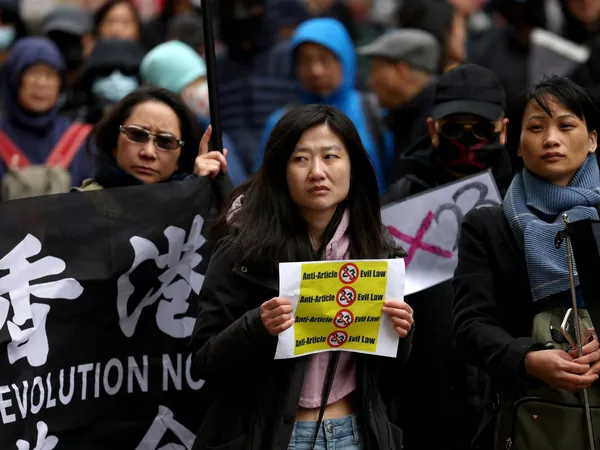
UK's Controversial Extradition Deal with Hong Kong: What You Need to Know
2025-07-25
Author: Jessica Wong
The UK government is set to revive its extradition agreement with Hong Kong, a decision that has reignited intense debate and concern about the implications of China's national security laws.
A Shocking Turn of Events
After five years of suspension triggered by serious concerns over Hong Kong's increasing authoritarianism, the UK Home Office submitted plans to Parliament on July 17 to reinstate this critical legal cooperation. Just a day later, Security Minister Dan Jarvis articulated the government's stance, stating the importance of maintaining effective extradition relationships to thwart criminal activities.
The Broader Picture
The UK isn't stopping at Hong Kong; extradition frameworks with other countries, including Chile and Zimbabwe, are also on the table. However, cases involving Hong Kong and Zimbabwe will be evaluated individually, a move that raises questions about the UK's commitment to human rights.
A Thorny Historical Relationship
Hong Kong's complicated history with Britain makes this decision particularly sensitive. The city was a British colony until 1997, when it was handed back to China under an agreement that promised a high degree of autonomy. Since the controversial introduction of national security legislation in 2020, the political landscape has drastically shifted, with many civil liberties being curtailed.
Fear of Persecution
Critics, including Conservative MP Alicia Kearns, argue that reinstating extradition ties with Hong Kong could legitimize a government that systematically violates human rights. Kearns expressed her fears on social media, branding the move as morally indefensible and counterproductive to any semblance of democracy in the region.
Defending the Decision
Despite these concerns, some voices, including Hong Kong barrister Ronny Tong, downplay the risks. He claims that the extradition process would be limited to non-political crimes, arguing that fears about political dissent being punished through extradition are unfounded. He insists that Hong Kong’s judiciary is independent and capable of safeguarding due process.
An Evolving Legal Landscape
Since the enactment of the national security law, which criminalizes a wide array of actions from secession to foreign interference, over 300 individuals have been arrested. The Hong Kong government argues that these measures are vital for maintaining stability following widespread protests.
A Chilling Effect on Activism
The chilling effects of these laws resonate beyond Hong Kong, as the government has sought international bounties against pro-democracy activists worldwide. Recently, a new list of bounties was issued for 19 activists based in Canada, indicating a relentless pursuit of dissenters.
Looking Ahead
As the UK moves to reinstate these extradition agreements against a backdrop of rising authoritarianism in Hong Kong, questions loom large. Will this decision facilitate justice or further entrench a system of persecution? Only time will tell as the global spotlight remains trained on the fate of freedoms in Hong Kong.





 Brasil (PT)
Brasil (PT)
 Canada (EN)
Canada (EN)
 Chile (ES)
Chile (ES)
 Česko (CS)
Česko (CS)
 대한민국 (KO)
대한민국 (KO)
 España (ES)
España (ES)
 France (FR)
France (FR)
 Hong Kong (EN)
Hong Kong (EN)
 Italia (IT)
Italia (IT)
 日本 (JA)
日本 (JA)
 Magyarország (HU)
Magyarország (HU)
 Norge (NO)
Norge (NO)
 Polska (PL)
Polska (PL)
 Schweiz (DE)
Schweiz (DE)
 Singapore (EN)
Singapore (EN)
 Sverige (SV)
Sverige (SV)
 Suomi (FI)
Suomi (FI)
 Türkiye (TR)
Türkiye (TR)
 الإمارات العربية المتحدة (AR)
الإمارات العربية المتحدة (AR)